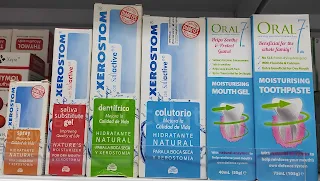Dry Mouth
Introduction
Xerostomia, commonly referred to as dry mouth, is one of most prevalent oral conditions due to its numerous causes.
- Primarily, it is characterized by a generalized feeling of dry oral tissues. Patients may also exhibit redness, peeling and cracking in and around the mouth.
Roles of Saliva
Saliva is largely composed of water, but also contains substances responsible for maintaining a neutral pH and healthy oral tissues.
It promotes oral health by providing antimicrobial, physical and chemical protection.
It assists in chewing, swallowing, digestion and speech formation.
Causes
Acutely, dry mouth may simply the result of dehydration of the oral tissues due to excessive mouth-breathing or systemic dehydration.
Chronically, issues with the neuronal input of the salivary glands may cause dry mouth.
Alternatively, dry mouth may also be result of various chronic conditions, medications and medical treatments.
Treatment
Nonpharmacologic methods
- Maintaining adequate hydration of the entire body, paying particular attention to the mouth
- Accomplished through frequent sipping of water, sucking on ice chips, and using a humidifier at night.
- Sugar-free gum or candies to stimulate salivary flow and alleviate dry mouth.
- Moisturise your lips to soothe dry or cracked areas
- Chew food thoroughly before swallowing because chewing stimulates saliva flow
- Smoking cessation
- Eliminating caffeine-containing products from diets.
- Avoiding mouthwashes that contain alcohol
- Change medications that cause dry mouth
Over-the-counter products
- Artificial saliva or saliva substitutes
- While the wetting effect of artificial saliva does not last long, these products can be used frequently and are relatively inexpensive, easy to use and safe.
- Sodium bicarbonate mouthwash
- A sodium bicarbonate mouthwash can be made by adding half a tablespoon of sodium bicarbonate powder to a glass of warm water. Rinse with mouthwash on waking and at any time during the day.
Prescription products
- Cholinergic agonists, such as pilocarpine 5 mg QID or cevimeline 30 mg TDS, are FDA-approved to treat xerostomia from Sjogren's syndrome.
- These medications are generally well tolerated.
- Their adverse effects include cholinergic-associated effects, such as sweating, indigestion, nausea and rhinitis.
External Links
- Pharmacotherapy: A Pathophysiologic Approach, 2020
- Cleveland Clinic - Dry Mouth
- Mayo Clinic - Dry Mouth
- NHS - Dry Mouth
- Medical News Today - Everything you need to know about dry mouth, 2018
- Sodium Bicarbonate Mouth Rinse is a Useful Safe-Care Method for Dry Mouth in Patients with Sjogren's Syndrome, 2022


Comments
Post a Comment